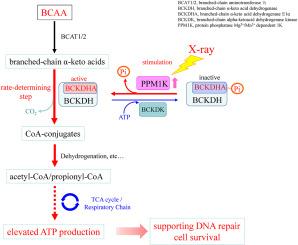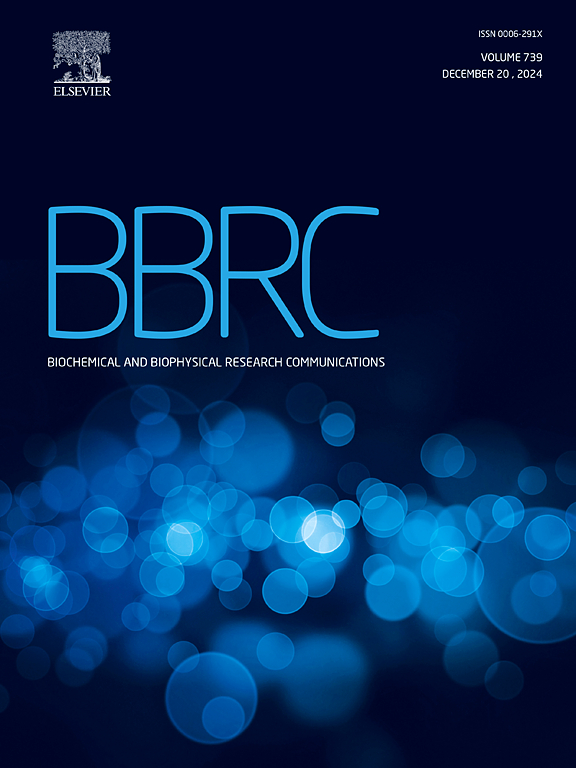Dephosphorylation of branched-chain α-keto acid dehydrogenase E1α (BCKDHA) promotes branched-chain amino acid catabolism and renders cancer cells resistant to X-rays by mitigating DNA damage
IF 2.2
3区 生物学
Q3 BIOCHEMISTRY & MOLECULAR BIOLOGY
Biochemical and biophysical research communications
Pub Date : 2025-01-01
DOI:10.1016/j.bbrc.2024.151154
引用次数: 0
Abstract
Branched-chain amino acids (BCAAs) facilitate cancer cell proliferation and survival. Stresses, including X-irradiation, increase BCAA uptake. However, the role of BCAA metabolism in cancer cell survival remains unclear. Therefore, this study aimed to elucidate the role of the BCAA catabolic pathway in cancer cell survival following X-irradiation. X-irradiation dose-dependently dephosphorylated branched-chain α-keto acid dehydrogenaseE1α (BCKDHA) suggesting the activation of the BCKDH complex, which catalyzes the rate-determining step of BCAA catabolism. We considered that activation of BCKDH promoted the BCAA catabolism, which resulted in cancer cell resistance to X-irradiation. Consistent with this notion, cells with BCKDHA knockdown exhibited increased radiosensitivity, which was associated with the increase in mitotic catastrophe and residual double-strand breaks by decreasing cellular ATP levels after X-irradiation. Our results suggest that BCKDHA dephosphorylation promotes BCAA catabolism, leading to cell survival by mitigating DNA damage after X-irradiation. Thus, BCAA catabolic pathway may be a target for radiation therapy.

支链α-酮酸脱氢酶E1α(BCKDHA)的去磷酸化促进了支链氨基酸的分解,并通过减轻DNA损伤使癌细胞对X射线具有抵抗力。
支链氨基酸(BCAAs)促进癌细胞的增殖和存活。应激,包括x射线照射,增加BCAA的摄取。然而,BCAA代谢在癌细胞存活中的作用尚不清楚。因此,本研究旨在阐明BCAA分解代谢途径在x射线照射后癌细胞存活中的作用。x射线照射剂量依赖性地使支链α-酮酸脱氢酶1α (BCKDHA)去磷酸化,表明BCKDH复合物被激活,从而催化了BCAA分解代谢的速率决定步骤。我们认为BCKDH的激活促进了BCAA的分解代谢,从而导致癌细胞对x射线的抵抗。与这一观点一致的是,BCKDHA敲低的细胞表现出更高的放射敏感性,这与有丝分裂灾难和残留双链断裂的增加有关,通过降低x照射后的细胞ATP水平。我们的研究结果表明,BCKDHA去磷酸化促进BCAA分解代谢,通过减轻x射线照射后的DNA损伤而导致细胞存活。因此,BCAA分解代谢途径可能成为放射治疗的靶点。
本文章由计算机程序翻译,如有差异,请以英文原文为准。
求助全文
约1分钟内获得全文
求助全文
来源期刊
CiteScore
6.10
自引率
0.00%
发文量
1400
审稿时长
14 days
期刊介绍:
Biochemical and Biophysical Research Communications is the premier international journal devoted to the very rapid dissemination of timely and significant experimental results in diverse fields of biological research. The development of the "Breakthroughs and Views" section brings the minireview format to the journal, and issues often contain collections of special interest manuscripts. BBRC is published weekly (52 issues/year).Research Areas now include: Biochemistry; biophysics; cell biology; developmental biology; immunology
; molecular biology; neurobiology; plant biology and proteomics

 求助内容:
求助内容: 应助结果提醒方式:
应助结果提醒方式:


